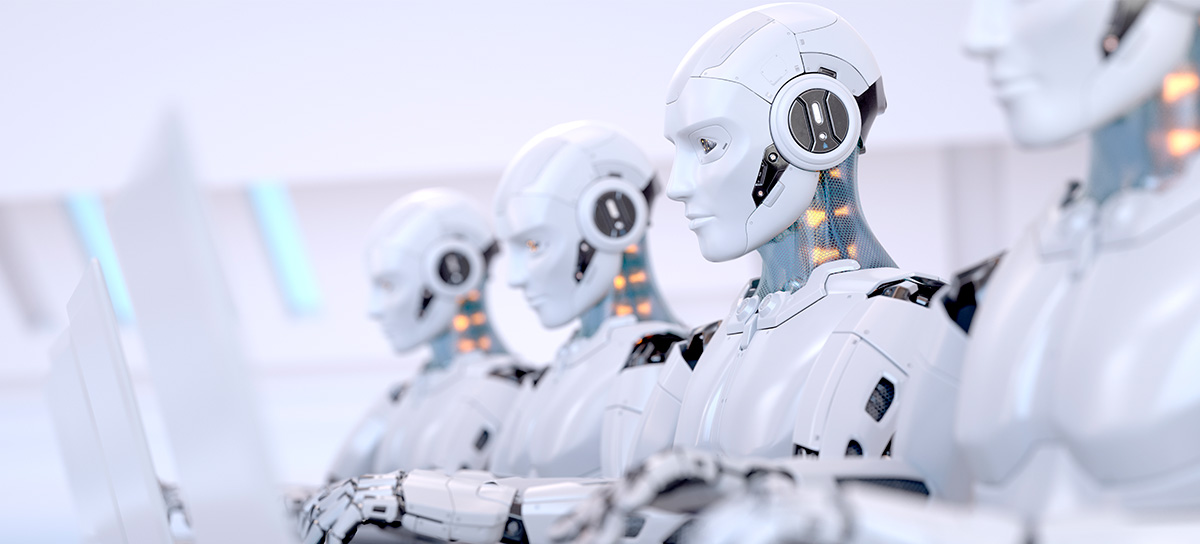Artificial intelligence (AI) is a key technology of digitalization. It has long been present in our private lives – for example in the form of voice assistants. AI is also increasingly finding its way into companies. Some people follow this development with diffuse concern. A closer look at the technological possibilities, however, shows that artificial intelligence even offers diverse opportunities to change our world for the better.
Weak AI vs. strong AI
In order to be able to objectively assess the opportunities and possible risks of artificial intelligence, it is necessary to understand two forms: weak and strong AI. Weak AI takes on tasks that are clearly defined by humans. However, it cannot develop a deep, human-like understanding of problem solving. Above all, it does not have the ability to learn independently in the universal sense. Strong AI, on the other hand, which is also called superintelligence, is supposed to attain or even surpass the intellectual abilities of humans.
To date, strong AI is merely science fiction. Experts discuss controversially when and whether it can become reality at all. It is also unclear today whether corresponding developments would not be stopped or restricted for ethical reasons. So for the time being, society and companies will only have the weak AI at their disposal. It does not act according to its own moral concepts, it merely follows patterns that have been trained into it. Thus, weak AI can never be responsible for an outcome. Nevertheless, the word weak should not be misinterpreted. Used sensibly, artificial intelligence can have a positive influence on the world of work, the efficiency of business processes, private life and many aspects of society.
AI handles routine works for employees
AI is a logical consequence of the ever-increasing volume of data. For humans, the amount of information we can read, hear, process and understand at the same time is severely limited. Artificial intelligence is clearly ahead of us in this respect. Those who use technology in a reflective manner in this sense can achieve great success. There are now numerous examples of this in the CIB Group portfolio.
CIB’s long-term goal is to relieve people of unpleasant and unproductive routine work so that there is more freedom for creative, value-adding activities. To this end, the company invests heavily in research and development with artificial intelligence. This has resulted, for example, in the solution CIB deepER (deep learning extended recognition). It recognises texts from photographed and scanned documents in order to digitise the content and make it searchable. Thanks to its “self-learning ability”, the algorithm gets better at recognising texts with each correction. The AI even masters slanted, distorted or vertical texts.
Solutions like CIB deepER have enormous potential, especially in document-intensive industries such as the financial services sector, insurance or public administration. Because in these areas, employees are busy every day receiving documents, classifying them and transferring their content into existing systems. With artificial intelligence, these subtasks can be largely automated. This leaves more time for the core tasks such as processing customer concerns or solving complicated processes.
Data protection, inclusion and more
AI can show its strengths not only in document-based processes. It is also capable of improving the protection of personal data. This is proven by the CIB PoP (Protect our Privacy) solution. CIB PoP removes, pseudonymises or anonymises information worthy of protection from documents completely and in compliance with the GDPR. For example, information such as age, gender, religion and appearance can be removed from application documents so that HR departments can make neutral decisions. Of course, this also benefits the applicants, who in this case are assessed purely on the basis of their qualifications.
Furthermore, CIB PoP is suitable for preparing documents for AI training. The solution not only removes personal information, but also replaces it with contextually similar content if necessary. After this process, the texts from the document can be used for AI development and training without violating the GDPR.
In addition, CIB is working on improving the accessibility of documents with the help of AI. For example, the software provider is working on the automatic conversion of non-structured documents into the accessible PDF/UA-Standard. Another field of activity is super-resolution, a process to improve the readability of documents with poor quality or low resolution.
Conclusion: AI has many beneficiaries
Document management, business processes, data protection and accessibility are just a few areas in which artificial intelligence can provide significant improvements. Incidentally, this applies to all process participants. First of all, companies and organizations achieve clear advantages through automated routine tasks, such as higher processing speeds and lower error rates. But employees also benefit, as they can now turn to more interesting, meaningful activities. Last but not least, there is added value for society as a whole – whenever AI enables time savings, simplifies our everyday lives, protects our data, breaks down barriers and promotes inclusion.






